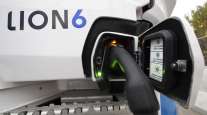Senior Reporter
CARB Rule Would Set Sale Quotas for Zero-Emission Trucks

[Stay on top of transportation news: Get TTNews in your inbox.]
The California Air Resources Board has proposed a regulation requiring that manufacturers sell a set percentage of zero-emissions battery-electric and fuel cell trucks beginning with model year 2024.
Also, the proposal would require carriers with U.S. gross revenues greater than $50 million or own more than 100 vehicles greater than 8,500 pounds that operate facilities in California to report their vehicle activity. The one-time reporting would need to be completed by April 1, 2021, and would include characteristics of vehicles domiciled or assigned to the facilities.

For Class 7 and Class 8 tractors, the regulation would require 3% of annual sales of zero-emissions tractors in California to begin in model year 2024, reaching 15% annually by model year 2030 and beyond.
Manufacturers could earn credits that may be banked and traded starting with 2021 model year, according to the proposal.
“Zero-emission technology continues to improve rapidly, and costs continue to come down so that zero-emission trucks and buses are now being offered in a wide variety of vehicle classes with varying electric range and utility,” said a summary of the Advanced Clean Trucks Regulation proposal. “Nearly 100 different models are commercially available in California with more to come.”
The agency said that zero-emission technology deployments are needed in the medium- and heavy-duty market to meet the state’s emission-reduction goals, “but to date, the major truck manufacturers have been relatively absent in this space.”
“For the past decade, smaller startup truck manufacturers have stepped in to fill market demand and have been designing and marketing zero-emission trucks,” CARB said.
Comments are being sought through Dec. 9, and the agency’s board is scheduled to convene a public hearing on the proposal Dec. 12, said Mike Tunnell, director of environmental affairs for American Trucking Associations. CARB could formally approve the proposal at its meeting in January.

Tunnell
Tunnell, who’s based in California, said ATA has not yet taken a position on the proposal but would do so before the comment deadline.
“Truck and Engine Manufacturers Association member companies are developing and promoting zero-emissions products and are very interested in seeing the market for ZEVs [zero-emission vehicles] expand,” said Timothy Blubaugh, executive vice president of EMA. “But we believe the Advanced Clean Trucks rule as proposed — as a simple sales mandate across all segments of the diverse commercial vehicle marketplace — is a flawed approach.”
Blubaugh said selling a truck is a business-to-business transaction, in which potential buyers look at factors such as upfront purchase costs, operational and maintenance costs, and residual values.
“They also need to make sure that their capital investments can return a profit,” he said.

Blubaugh
“If the bottom line of a fleet’s business can be enhanced with a new truck, they’ll buy it,” Blubaugh told Transport Topics. “So if they look at a zero-emission truck, and they can’t pencil it out, they simply won’t buy that product.”
He added, “We support efforts to accelerate the zero-emission commercial vehicle marketplace. But, the narrow and unrealistic structure of the current proposal would force manufacturers to develop and attempt to sell a product their customers may not want to buy and may not be able to profitably use. As such, CARB’s rule could set the market backwards.”
However, the agency said a wide assortment of zero-emission trucks and buses are commercially available today that exceed 100 miles of available range. Also, several battery-electric and fuel cell models are being demonstrated that exceed more than 200 miles per day.
Yet, CARB conceded that zero-emission trucks do not yet have broad dealer networks or regional service facilities that can be leveraged quickly to provide support and maintenance services for large numbers of zero-emission trucks, and also may lack the ability to deliver large orders for major fleets that have been interested in operating zero-emission trucks.
CARB said the primary objectives of the proposed regulation include:
- Accelerate first wave of zero-emission true deployments in best suited applications.
- Achieve 100% zero-emission pickup and delivery in local applications by 2040.
- Support the Ports of Los Angeles and Long Beach Clean Air Action Plan for 100% zero-emission drayage trucks by 2035.
- Support AB 739 requiring California state government fleets to purchase ZEVs.
- Enable a large-scale transition to zero-emission technology.
- Maximize the total number of ZEVs deployed.
- Complement existing and future programs.
- Provide environmental benefits, especially in disadvantaged communities.
- Ensure requirements are technologically feasible and cost effective.
- Foster a self-sustaining zero-emission truck market.
Want more news? Listen to today's daily briefing:




